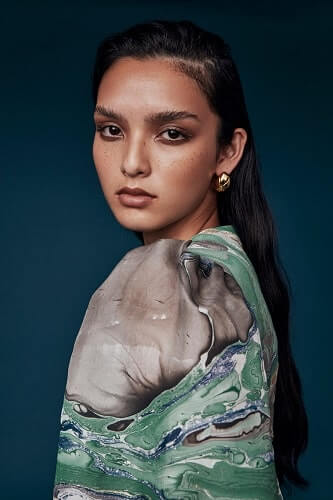Sending her models down the runway at Melbourne Fashion Festival this year, on International Women’s Day no less, was a big deal for designer Kudrat Makkar.
“It was such an honour for me and my brand Mastani,” Makkar tells Indian Link. “It also honoured the women we dress, many of who were in the audience.”
Her showcase presented Indian textiles in the modern context. With emphasis on bold shoulders, powerful sleeves and cinched waists, designer Kudrat Makkar’s outfits for Mastani are just as much about strength as about beauty.
This year’s event at the Royal Exhibition Building was in fact Makkar’s third appearance at the annual fashion fest.
View this post on Instagram
Looking back at her first show, Makkar, 32, reveals, “It was overwhelming, to be showing alongside big names like Carla Zampatti and Jason Grech. It was a surprise actually, having been headhunted for the event.”
To see her “really small collection”, on her first major runway, became a game changer, given her brand now attracts a high-end clientele.
View this post on Instagram
Founded in July 2018, this luxury designer-wear brand based in Melbourne is built on sustainability. Through Mastani, Kudrat Makkar introduces the incredible Indian traditions and craftsmanship of cultural heritage to the modern Australian market.
“Having always had an interest in fashion, I had spent a lot of time observing international brands and local Australian brands, the women that wear them, the fabrics they use, their silhouettes, their ethos. The more I observed, the more I noticed a decline in the quality of fabrics being used, garments produced en masse and the habit of quickly discarding trends and fads, even though sustainable and ethical fashion was becoming a popular movement,” she rues.
Makkar, therefore, built her brand on this idea of celebrating her roots and craft of the local Indian artisans. Mastani’s atelier is based in Bengaluru, where all garment construction is performed.
“Sometimes, the old way is the best way – as with traditional Indian textiles and techniques which use natural locally sourced yarns/fibres, natural dyes and slow making/weaving processes all done by hand,” she explains. “This is the original and authentic ‘slow fashion’ – something I wanted to embrace to create beautiful garments, of the highest quality that would last a lifetime and beyond.”

Kudrat Makkar creates limited quantities of each fabric and garment to ensure exclusivity and minimise use of resources for Mastani. Her artisans use handmade traditional techniques and give a touch of modernity to the designs.
“Hand-looming, natural dye processes, tie-dye and hand-embroidery are some of the techniques that are integral to Mastani collections – techniques that have been passed on through generations of artisans and that I hope continue to adapt to the needs of the modern world and markets to ensure their future.”
When deciding the colour palettes and mood for each collection, Makkar says she likes to follow her instinct rather than going by the trend.
“My grounding palette for collections is decided in silk satins – often featuring elegant, muted tones or rich jewel tones that show off the incredible lustre of our hand-loomed silk. Working within the palette of natural pigments is inspiring in itself – utilising flower petals, madder root, coconut husks and indigo for example to create naturally vibrant colour and incredible prints.”

The name Mastani of course comes from the Bundelkhand princess whose story has been adapted into many movies and books.
“She challenged the stereotypes of women in her day, and I hope women feel empowered in my clothing to do the same today,” Makkar smiles. “I love to exaggerate the beautiful female form in my silhouettes but strength and confidence are just as important. My choice of fabrics and embellishments bring another dimension – linear hand-piping that creates structural form, sensual fluid silks, complex metallic jacquards reminiscent of armour, glittering mirror-embellishment to ward off the evil eye.”

Makkar also credits her parents for their influence.
Growing up in Punjab’s Jalandar city, her mum inspired her into the world of fashion. “She would look to European designers for westerns trends and adapt them in her own way,” Makkar remembers. “From her, I developed my love and appreciation for traditional textiles.”
Her dad, for his part, fostered a strong business mind in her. “He encouraged me to develop the resilience, confidence and passion that I have today.”
So what is next for the young entrepreneur, we ask. “I hope to expand Mastani within Australia, opening a handful of stores in select locations and one day stores overseas. That said, I am very considered in my approach to growing the brand – it is important to me to stay true to my sustainable ethos and preserve the exclusivity and limited-edition nature of Mastani.”
READ ALSO: Youngest Indian designer to showcase at Paris Fashion Week





